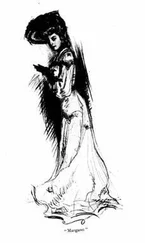James Cabell - Jurgen. A Comedy of Justice
Здесь есть возможность читать онлайн «James Cabell - Jurgen. A Comedy of Justice» весь текст электронной книги совершенно бесплатно (целиком полную версию без сокращений). В некоторых случаях можно слушать аудио, скачать через торрент в формате fb2 и присутствует краткое содержание. Жанр: Фэнтези, на английском языке. Описание произведения, (предисловие) а так же отзывы посетителей доступны на портале библиотеки ЛибКат.
- Название:Jurgen. A Comedy of Justice
- Автор:
- Жанр:
- Год:неизвестен
- ISBN:нет данных
- Рейтинг книги:5 / 5. Голосов: 1
-
Избранное:Добавить в избранное
- Отзывы:
-
Ваша оценка:
- 100
- 1
- 2
- 3
- 4
- 5
Jurgen. A Comedy of Justice: краткое содержание, описание и аннотация
Предлагаем к чтению аннотацию, описание, краткое содержание или предисловие (зависит от того, что написал сам автор книги «Jurgen. A Comedy of Justice»). Если вы не нашли необходимую информацию о книге — напишите в комментариях, мы постараемся отыскать её.
Jurgen. A Comedy of Justice — читать онлайн бесплатно полную книгу (весь текст) целиком
Ниже представлен текст книги, разбитый по страницам. Система сохранения места последней прочитанной страницы, позволяет с удобством читать онлайн бесплатно книгу «Jurgen. A Comedy of Justice», без необходимости каждый раз заново искать на чём Вы остановились. Поставьте закладку, и сможете в любой момент перейти на страницу, на которой закончили чтение.
Интервал:
Закладка:
"It is so written, Messire Jurgen."
Jurgen shrugged. "I too, in the intervals of business, have written much that is beautiful. Very often my verses were so beautiful that I would have given anything in the world in exchange for somewhat less sure information as to the author's veracity. Ah, no, madame, desire and knowledge are pressing me so sorely that, between them, I dare not love you, and still I cannot help it!"
Then Jurgen gave a little wringing gesture with his hands. His smile was not merry; and it seemed pitiful that Guenevere should not remember him.
"Madame and queen," says Jurgen, "once long and long ago there was a man who worshipped all women. To him they were one and all of sacred, sweet intimidating beauty. He shaped sonorous rhymes of this, in praise of the mystery and sanctity of women. Then a count's tow-headed daughter whom he loved, with such love as it puzzles me to think of now, was shown to him just as she was, as not even worthy of hatred. The goddess stood revealed, unveiled, and displaying in all things such mediocrity as he fretted to find in himself. That was unfortunate. For he began to suspect that women, also, are akin to their parents; and are no wiser, and no more subtle, and no more immaculate, than the father who begot them. Madame and queen, it is not good for any man to suspect this."
"It is certainly not the conduct of a chivalrous person, nor of an authentic poet," says Queen Guenevere. "And yet your eyes are big with tears."
"Hah, madame," he replied, "but it amuses me to weep for a dead man with eyes that once were his. For he was a dear lad before he went rampaging through the world, in the pride of his youth and in the armor of his hurt. And songs he made for the pleasure of kings, and sword play he made for the pleasure of men, and a whispering he made for the pleasure of women, in places where renown was, and where he trod boldly, giving pleasure to everybody in those fine days. But for all his laughter, he could not understand his fellows, nor could he love them, nor could he detect anything in aught they said or did save their exceeding folly."
"Why, man's folly is indeed very great, Messire Jurgen, and the doings of this world are often inexplicable: and so does it come about that man can be saved by faith alone."
"Ah, but this boy had lost his fellows' cordial common faith in the importance of what use they made of half-hours and months and years; and because a jill-flirt had opened his eyes so that they saw too much, he had lost faith in the importance of his own actions, too. There was a little time of which the passing might be made not unendurable; beyond gaped unpredictable darkness; and that was all there was of certainty anywhere. Meanwhile, he had the loan of a brain which played with ideas, and a body that went delicately down pleasant ways. And so he was never the mate for you, dear Guenevere, because he had not sufficient faith in anything at all, not even in his own deductions."
Now said Queen Guenevere: "Farewell to you, then, Jurgen, for it is I that am leaving you forever. I was to them that served me the lovely and excellent masterwork of God: in Caerleon and Northgalis and at Joyeuse Garde might men behold me with delight, because, men said, to view me was to comprehend the power and kindliness of their Creator. Very beautiful was Iseult, and the face of Luned sparkled like a moving gem; Morgaine and Enid and Viviane and shrewd Nimuë were lovely, too; and the comeliness of Ettarde exalted the beholder like a proud music: these, going statelily about Arthur's hall, seemed Heaven's finest craftsmanship until the Queen came to her daïs, as the moon among glowing stars: men then affirmed that God in making Guenevere had used both hands. And it is I that am leaving you forever. My beauty was no human white and red, said they, but an explicit sign of Heaven's might. In approaching me men thought of God, because in me, they said, His splendor was incarnate. That which I willed was neither right nor wrong: it was divine. This thing it was that the knights saw in me; this surety, as to the power and kindliness of their great Father, it was of which the chevaliers of yesterday were conscious in beholding me, and of men's need to be worthy of such parentage; and it is I that am leaving you forever."
Said Jurgen: "I could not see all this in you, not quite all this, because of a shadow that followed me. Now it is too late, and this is a sorrowful thing which is happening. I am become as a rudderless boat that goes from wave to wave: I am turned to unfertile dust which a whirlwind makes coherent, and presently lets fall. And so, farewell to you, Queen Guenevere, for it is a sorrowful thing and a very unfair thing that is happening."
Thus he cried farewell to the daughter of Gogyrvan Gawr. And instantly she vanished like the flame of a blown out altar-candle.
46. The Desire of Anaïtis
And again Koshchei waved his hand. Then came to Jurgen a woman who was strangely gifted and perverse. Her dark eyes glittered: upon her head was a net-work of red coral, with branches radiating downward, and her tunic was of two colors, being shot with black and crimson curiously mingled.
And Anaïtis also had forgotten Jurgen, or else she did not recognize him in this man of forty and something: and again belief awoke in Jurgen's heart that this was the only woman whom Jurgen had really loved, as he listened to Anaïtis and to her talk of marvelous things.
Of the lore of Thaïs she spoke, and of the schooling of Sappho, and of the secrets of Rhodopê, and of the mourning for Adonis: and the refrain of all her talking was not changed. "For we have but a little while to live, and none knows his fate thereafter. So that a man possesses nothing certainly save a brief loan of his own body: and yet the body of man is capable of much curious pleasure. As thus and thus," says she. And the bright-colored pensive woman spoke with antique directness of matters that Jurgen, being no longer a scapegrace of twenty-one, found rather embarrassing.
"Come, come!" thinks he, "but it will never do to seem provincial. I believe that I am actually blushing."
Aloud he said: "Sweetheart, there was—why, not a half-hour since!—a youth who sought quite zealously for the over-mastering frenzies you prattle about. But, candidly, he could not find the flesh whose touch would rouse insanity. The lad had opportunities, too, let me tell you! Hah, I recall with tenderness the glitter of eyes and hair, and the gay garments, and the soft voices of those fond foolish women, even now. But he went from one pair of lips to another, with an ardor that was always half-feigned, and with protestations which were conscious echoes of some romance or other. Such escapades were pleasant enough: but they were not very serious, after all. For these things concerned his body alone: and I am more than an edifice of viands reared by my teeth. To pretend that what my body does or endures is of importance seems rather silly nowadays. I prefer to regard it as a necessary beast of burden which I maintain, at considerable expense and trouble. So I shall make no more pother about it."
But then again Queen Anaïtis spoke of marvelous things; and he listened, fair-mindedly; for the Queen spoke now of that which was hers to share with him.
"Well, I have heard," says Jurgen, "that you have a notable residence in Cocaigne."
"But that is only a little country place, to which I sometimes repair in summer, in order to live rustically. No, Jurgen, you must see my palaces. In Babylon I have a palace where many abide with cords about them and burn bran for perfume, while they await that thing which is to befall them. In Armenia I have a palace surrounded by vast gardens, where only strangers have the right to enter: they there receive a hospitality that is more than gallant. In Paphos I have a palace wherein is a little pyramid of white stone, very curious to see: but still more curious is the statue in my palace at Amathus, of a bearded woman, which displays other features that women do not possess. And in Alexandria I have a palace that is tended by thirty-six exceedingly wise and sacred persons, and wherein it is always night: and there folk seek for monstrous pleasures, even at the price of instant death, and win to both of these swiftly. Everywhere my palaces stand upon high places near the sea: so they are beheld from afar by those whom I hold dearest, my beautiful broad-chested mariners, who do not fear even me, but know that in my palaces they will find notable employment. For I must tell you of what is to be encountered within these places that are mine, and of how pleasantly we pass our time there." Then she told him.
Читать дальшеИнтервал:
Закладка:
Похожие книги на «Jurgen. A Comedy of Justice»
Представляем Вашему вниманию похожие книги на «Jurgen. A Comedy of Justice» списком для выбора. Мы отобрали схожую по названию и смыслу литературу в надежде предоставить читателям больше вариантов отыскать новые, интересные, ещё непрочитанные произведения.
Обсуждение, отзывы о книге «Jurgen. A Comedy of Justice» и просто собственные мнения читателей. Оставьте ваши комментарии, напишите, что Вы думаете о произведении, его смысле или главных героях. Укажите что конкретно понравилось, а что нет, и почему Вы так считаете.



